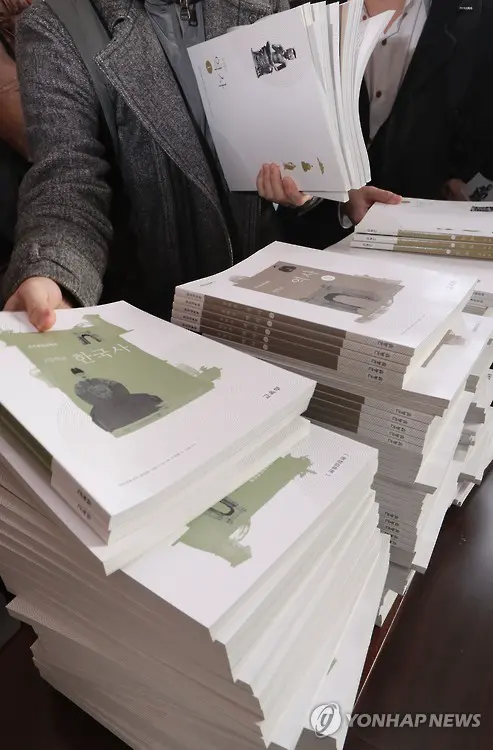The South Korean government on Monday revealed the pilot editions of the controversial state-authored history textbooks to be introduced next year, igniting academic and ideological debates over the country's history.
The Ministry of Education and the National Institute of Korean History (NIKH) revealed textbooks for middle and high school students during a press briefing in Seoul.
"The new history textbooks were developed with the aim of our students gaining a balanced view of history and proper view of state, not leaning towards any particular ideology," said Lee Joon-sik, education minister and deputy prime minister for social affairs, in a statement.
There has been criticism that existing textbooks are "left" leaning in some areas and are too harsh on South Korea's numerous achievements in the political realm, social change and the economy, while downplaying abuses and negative aspects of North Korea and its family-run leadership.
In the revised version, Aug. 15, 1948 -- three years after Korea's liberation from Japan's 1910-45 colonial rule -- was described as the day of the "foundation of the Republic of Korea (ROK)," or South Korea, instead of the "establishment of the ROK government."
The phrase was one of the most fiercely debated issues in the textbooks, as local historians claim that the country already existed in the form of a government-in-exile, which was set up in Shanghai in 1919 to win independence from Japanese colonial rule.
Meanwhile, the "establishment of the Democratic People's Republic of Korea," or North Korea, was revised to the "establishment of the North Korean government," according to the ministry.
The ministry said the changes were aimed at asserting the legitimacy of the foundation of South Korea.
The new textbooks clarified that the Korean War (1950-53) was triggered by North Korea. They also dedicated more parts to the North's latest military provocations and its human rights violations, according to the ministry.
The ministry said there was a more positive explanation of South Korea's economic growth, in contrast to the current textbooks that focused more on the side effects of the development.
The ministry also unveiled the list of its writing staff, which it had been declining to make public.
"We have organized the writing staff with those holding authority in the academic circle to develop South Korea's textbooks that are faithful to historical facts and the constitutional values," Lee said. "Experts from various fields and classroom teachers participated in the process with heart and soul."
The ministry said it will receive opinions on the new textbooks until Dec. 23, with a plan to complete the final version by January.
Anyone can have access to the textbooks in the form of an ebook and submit comments via the Internet.
In October last year, the government announced its plan to revise the current textbook publication system to address what it called predominantly left-leaning content in the current materials.
The textbooks are currently published by eight private publishing companies, while primary schools have a single set of national history textbooks.
The ministry said the adoption of state-authored textbooks -- first introduced under late President Park Chung-hee, the father of President Park Geun-hye -- was pushed as the government concluded that it is difficult to fundamentally resolve the bias issue under the existing approval system.
The decision has sparked nationwide protests from opponents who said it is an anachronistic step that could be abused by those holding authority and fail to introduce various historical viewpoints.
(YONHAP)
 简体中文
简体中文

